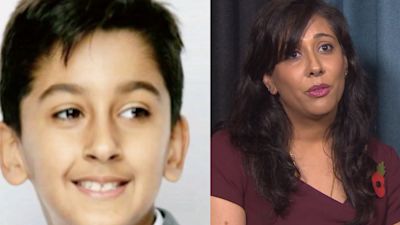'No deaths are acceptable': Mother whose son died in smart motorway crash backs pause in rollout

A mum whose eight-year-old son was killed in a collision on a section of a smart motorway has said "no deaths are acceptable".
Meera Naran, who is from Leicester, told ITV Central: "It's painful and it's devastating to lose someone in such a sudden way on the road like that."
Her son, Dev Naran, died in May 2018 when he was killed on a section of smart motorway. A lorry hit his grandfather's car on the hard shoulder of the M6, used by moving traffic.
Ms Naran has welcomed a report from MPs that the rollout of smart motorways, which was first announced in 2020, should be suspended due to safety concerns.
She says she supports the government’s adoption of the 18 point action plan, which was also welcomed by this report. It aims to improve safety on all stretches of smart motorways.
"No deaths are acceptable and we need to look at the aim of zero deaths and that's it," Ms Naran says
Smart motorways were first introduced in England in 2014 as a cheaper way of increasing capacity compared with widening carriageways.
Ms Naran said it is a good option to hold it out for now, but "there are a series of factors involved that led to the devastating outcome of me losing my son."
"But all of the factors, we need to look at all of them to mitigate these risks and avoid fatalities which is absolutely devastating and heartbreaking."
Her comments come as the Commons' Transport Select Committee (TSC) said there is not enough safety and economic data to justify continuing with the project.
Tory MP Huw Merriman, who chairs the committee, said: "Looking at the available evidence, smart motorways do appear to be safer than conventional motorways even once the hard shoulder is removed."
'Roads don't kill, cars don't kill,' says Ms Naran, whose eight-year-old son died in a smart motorway collision
He added: "However, this evidence is also open to question. Only 29 miles of these all-lane running smart motorways have operated for over five years.
“It therefore feels too soon, and uncertain, to use this as an evidence base to remove the hard shoulder from swathes of our motorway network".
Demonstrators protesting against smart motorways marched with coffins to the Houses of Parliament on Monday November 1.
Among them was motorcyclist Jack Gallowtree from Wolverhampton who suffered life changing injuries earlier this year.
His motorbike started to break down and lose power on the M6 - but the smart motorway left him no hard shoulder to pull onto and he ended up trapped between his bike and a barrier.
"I almost lost my life...there's no logical reason for you to remove a hard shoulder,"
Mr Gallowtree told ITV Central: "Smart motorways almost cost me an arm and a leg, with the receipt of the hidden costs of profiting over people - that's all it essentially is."
A Department for Transport spokesperson said: “We welcome the Transport Committee’s scrutiny and will now consider its recommendations in detail, providing a formal response in due course.
"This is a serious piece of work which we will engage with closely in the months ahead."
The spokesperson added: "We’re pleased that the TSC recognises that reinstating the hard shoulder on all all-lane running motorways could put more drivers and passengers at risk of death and serious injury and that we’re right to focus on upgrading their safety, as the Secretary of State committed to doing when he became Transport Secretary.
"We recognise that improvements have not always been made as quickly as they could have been in the past."
"But as the committee has set out, the Transport Secretary is absolutely committed to making smart motorways as safe as possible, including committing £500 million on upgrades and the faster rollout of Stopped Vehicle Detection," the spokesperson said.